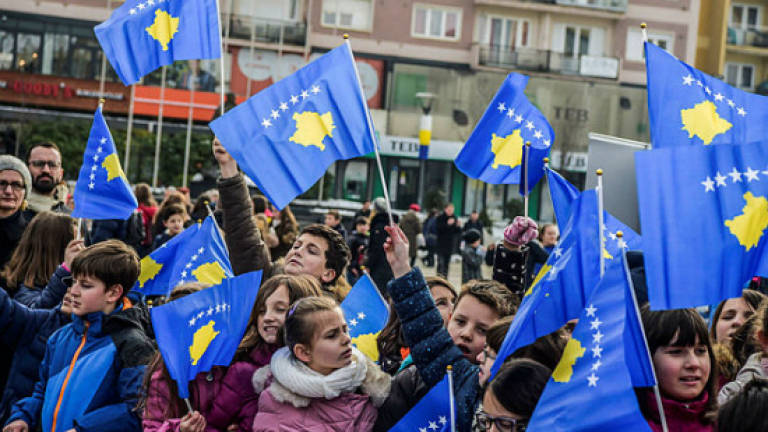Kosovo celebrates 10 years of sovereignty-in-progress

PRISTINA: Kosovo on Saturday celebrates 10 years since its unilateral declaration of independence — a sovereignty still under construction and stubbornly rejected by its Serb minority and Belgrade.
Pristina takes any opportunity to affirm its independence: although unlikely to become a snow-sports power, it proudly celebrated skier Albin Tahiri, Kosovo's lone athlete in last week's opening parade in Pyeongchang and its first sportsman in a Winter Olympics.
Some 115 countries now recognise the predominantly ethnic Albanian territory as a state, including 23 of the 28 EU members and the United States, a leading ally.
While Pristina's streets are covered in Kosovo's blue-and-yellow flags ahead of the landmark anniversary, this is not the case in areas that are home to the ethnic Serb minority.
Here allegiance remains with Belgrade and the Serbian flag flies high, although Serb MPs can now be seen in Kosovo's parliament and government.
With Russia's support, Serbia conducts guerrilla diplomacy against Kosovo, successfully closing the door of the United Nations and various other international institutions, such as Interpol, to its former province.
Rejection of Serb autonomy
Belgrade's unqualified rejection prevents Pristina's control over entire areas of Kosovo.
This is particularly the case in the northern city of Mitrovica, sharply divided by ethnicity since the 1998-1999 war between Kosovo's Albanian rebels and Serbian troops. The war left around 13,000 people dead, mostly Albanians.
An EU-brokered deal with Belgrade to "normalise" relations agreed on establishing an association of Serb municipalities to improve the rights of Kosovo's Serbs. But it has not come into force, with Pristina rejecting the autonomy sought by Belgrade.
Serbs make up around 120,000 of Kosovo's 1.8 million people — an estimated figure as they refused to participate in the last census in 2011.
"The territorial integrity of Kosovo is intangible, indivisible, and internationally recognised," Kosovo's President Hashim Thaci said this week.
The former political chief of the rebel Kosovo Liberation Army (KLA), Thaci told AFP in a recent interview that he wanted a "final historic agreement" with Belgrade this year.
"I believe definitely that dialogue is the only way forward for Kosovo and Serbia," Thaci said.
"The international community will have to accept" such a deal, he added.
Relations between Pristina and its Western allies have been strained for the past year, since Thaci submitted plans, later withdrawn, to establish an army without constitutional changes.
Since the 1990s conflict, Kosovo's security has been assured by Nato-led multinational troops.
Economic failure
Western powers reacted more strongly in December, when Kosovan MPs unsuccessfully tried to block a new war crimes tribunal set up in The Hague, which is due to try allegations against former members of the KLA.
Ex-leaders of the guerrilla army still dominate the political landscape, and many elected officials see the EU-backed court as biased and a violation of Kosovo's sovereignty, although it operates under Kosovan law.
The EU sees room for improvement elsewhere: according to its 2016 report on Kosovo, "corruption remains prevalent in many areas and continues to be a very serious problem".
A priority for Kosovo's citizens is winning visa-free travel in the EU, a benefit that depends on the settlement of a border dispute with Montenegro.
An estimated 700,000 Kosovo Albanians are already living abroad, sending crucial remittances to a country that remains one of the poorest in Europe.
Many others aspire to leave and find work overseas, with Kosovo's unemployment rate affecting nearly a third of the population and half of those aged up to 24, according to official figures. — AFP